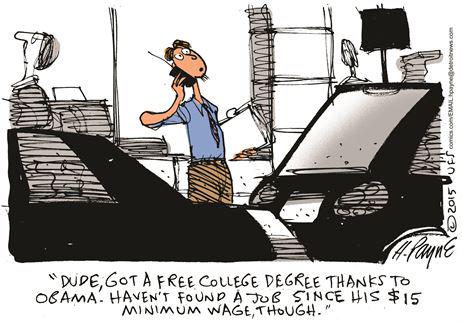News Story of the Day: In his “Waste Report,” Kentucky Republican Senator and 2016 presidential candidate Rand Paul found that federal agencies spent more than $150,000 since 2013 to offer free yoga classes to government employees.
According to the report, the State Department spent $15,000 on yoga for Washington, D.C. employees, while the Energy Department has spent $11,000 per year on pilates in the state of California.
“Maybe you saw a Groupon for yoga classes and considered it, but even at a discount you were not sure you wanted to spend the money,” Paul said in the report. “Well if you were an employee at certain federal agencies you would not have to worry about cost, because the U.S. taxpayer will pick up the tab.”
Moreover, it’s been discovered that the Department of Veterans Affairs and the Department of Defense spent the most on yoga, but they were omitted from the report because they’re great for rehabilitating troops or remedying military-related illnesses.
Nevertheless, Paul added: “Not all agencies that offer employees yoga at work also pay for the cost; many agencies, including the U.S. Senate, require participants to pay for the class.”
Chart of the Day: AdBlock is a very popular Internet browser add-on. These applications, which are available on both desktop and mobile devices, block banner ads, pop-up ads, video ads and all other types of ads. This chart showcases just how popular adblock has become for users around the world (courtesy of the Business Insider).

Illustration of the Day: Millennials may celebrate the ideas of free post-secondary education and $15 minimum wage. But millennials may not be as jovial when the free college diploma won’t mean a thing if you can’t find a job. This is something this illustration highlights (courtesy of American Enterprise Institute’s Mark Perry).

Quote of the Day: Economist Ludwig von Mises on how time preference is a category of human action.
“No mode of action can be thought of in which satisfaction within a nearer period of the future is not — other things being equal — preferred to that in a later period. The very act of gratifying a desire implies that gratification at the present instant is preferred to that at a later instant. He who consumes a nonperishable good instead of postponing consumption for an indefinite later moment thereby reveals a higher valuation of present satisfaction as compared with later satisfaction. If he were not to prefer satisfaction in a nearer period of the future to that in a remoter period, he would never consume and so satisfy wants. He would always accumulate, he would never consume and enjoy. He would not consume today, but he would not consume tomorrow either, as the morrow would confront him with the same alternative. Time preference is a category of human action.”
Video of the Day: In this video, Friedrich Hayek speaks with Leo Rosten on how John Maynard Keynes was ignorant on economics. Although he continually explained how intelligent Keynes was, Hayek noted that economics to Keynes was a secondary interest. It’s great to see how respectful Hayek was of Keynes, which is something you won’t see from the likes of Keynesians and their regard of Austrians.
Leave a Comment